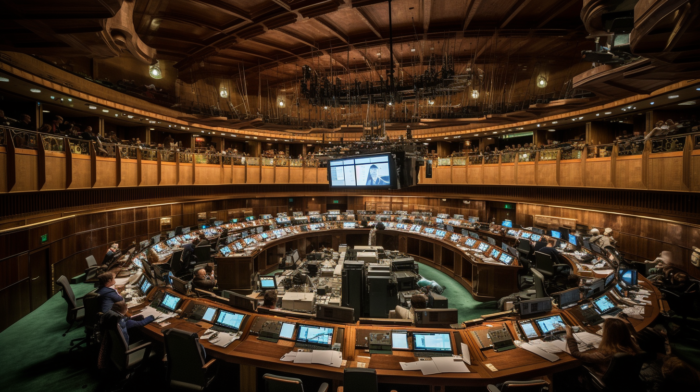
In March, Spain passed a gender quotas law aimed at raising the number of women in leadership roles across the country. Among other requirements, the law calls requires political parties to put forward equal numbers of male and female candidates in municipal and national elections.
After months of extracting and analyzing information from parliamentary websites, documents, and other public records, Demócrata — a recently launched news outlet focused on Spanish government and public policy — published a series finding that in general Parliamentary sessions, the ones that get the most attention, men gave nearly two-thirds of the speeches. Women were underrepresented on congressional committees related to “state matters” like defense, economic affairs, and budgeting, but make up the majority of members on committees focused on equality, gender violence, and children’s rights.
Stories like these are what Demócrata aims to provide news consumers in Spain: Data-based journalism that helps to holds politicians accountable. That series, for example, included a methodology of how the journalists obtained the data, organized it, and decided what to include. (For instance: “Participations of less than one minute duration have also been left out. They mostly deal with oaths to take possession of seats, questions of order, requests to speak…They accounted for less than 1% of the total interventions collected.”)
“It brings a lot of transparency to the legislative process,” said Pilar Velasco, a veteran investigative journalist and Demócrata’s editorial director. “When the noise of politics occupies the entire news cycle, it generates a space for opacity that isn’t reported on.”
The site fills a gap in Spain, which will hold its general election in December. “It’s a good year to launch a news outlet with a focus on politics and policies,” said Eduardo Suárez, the head of editorial for the Reuters Institute for the Study of Journalism. “[Demócrata’s] value proposition is to report on public policies and Parliamentary debates in much more detail than mainstream publications. Newspapers in Spain are much more focused on politics than on public policies, and this might provide an opening for a publication like Demócrata, whose goal is to cover those policy debates in a more nuanced and granular way.”
Demócrata is the country’s only news outlet that specifically covers Parliament and public policy from an accountability lens daily, according to the Iberian Digital Media Map by Iberifier, a European Commission–funded initiative. (Another initiative in Spain, Civio, was founded in 2012 and focuses on data-powered watchdog reporting on the environment, healthcare, and the justice system.)
Demócrata has a team of seven. It’s funded by an initial investment from its board of directors and from advertising, though Velasco wants to expand into sponsorships, paid events, and subscriptions. The site has multiple sections: Agenda (an archive of the weekly newsletter that summarizes what’s happening in Parliament in the coming week), Actualidad (updates and play-by-play of laws and amendments), Políticas (news on proposed and ongoing policies), Quieren Influir (economy stories), and an analysis and opinion section. The site’s initial target audience is political insiders and politics junkies, but Velasco said the stories are written so that general audiences will be able to understand them as well. The Agenda newsletter has around 2,000 subscribers.
Demócrata’s goal is to use its data expertise to tell stories that other outlets can’t. Leading up to the outlet’s launch, the data team spent months building the software it uses to scrape and analyze data that, while technically public, is disorganized and difficult to parse. When the country’s far-right party, Vox, called for a vote of no confidence against the current ruling socialist party this past March, Demócrata published an analysis of Vox’s legislative footprint in the current parliamentary session, finding that the party has so far failed to pass any laws.
Velasco, who was an investigative reporter for Spain’s largest radio network Cadena SER, where she investigated political corruption cases, experienced first-hand the challenges of telling data stories for radio, where it can be difficult to delve into numbers. As a 2018 Yale World Fellow and one of the co-founders of Spain’s Investigative Journalists Association, she also saw American sites like Politico cultivated audiences for in-depth political reporting. When Demócrata founder David Córdova (who is also the director of a public affairs consulting firm, Vinces) approached her for the project, she saw it as a chance to experiment and try something new. (Demócrata is editorially independent from Vinces.)
“The mission is permanent scrutiny of institutions,” Velasco said. “Through continuous supervision of the work of politicians and legislators, information transparency, we believe, can strengthen institutional credibility. [The news] that comes to us from Parliament is often the political discussion, statements, politicians fighting with each other, and press conferences. But the legislative branch is a pillar of the State where many things happen that regulate life in society. It is what orders us and regulates us. And all of that wasn’t being covered in Spain with the specialization it deserves.”
One of Velasco’s goals in the next few months is to continue the work on a platform, already in progress, that will monitor updates to every piece of legislation in Parliament in real time. Down the line, she hopes to launch a chatbot that can answer reader questions. Demócrata has also partnered with Political Watch (a group of academics who monitor Parliament), design studio Flat26, and the think tank Ethosfera, which is helping Demócrata with its own ethics and transparency policies.
“We sort of feel like a hub for people who already had innovative ideas about parliamentary information,” Velasco said. “We get a lot of pitches for [collaborations]. When that you’re a small outlet, to grow you have to put springboards in places to get to the next level, and you can’t get there on your own.”